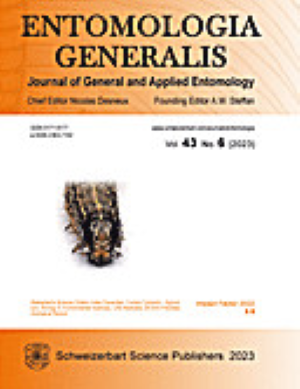竹炭土壤改良剂对番茄害虫 Bemisia tabaci 的自下而上的影响
IF 4.6
1区 农林科学
Q1 ENTOMOLOGY
引用次数: 0
摘要
土壤改良剂可在作物与食草害虫的相互作用中引发自下而上的效应,从而影响害虫管理,而生物炭则可促进植物生长并增强对植物害虫的抵抗力。我们在实验室和田间条件下研究了再生生物炭竹炭对番茄(Solanum lycopersicum)和主要害虫烟粉虱(Bemisia tabaci)的自下而上效应。与对照组相比,竹炭处理的植株高度、茎直径、叶片干鲜重比以及游离氨基酸、淀粉和可溶性糖的含量均有所增加。此外,一些植物抗性物质或酶活性(如类黄酮、苯丙氨酸氨裂解酶和超氧化物歧化酶)在不同处理间存在差异。施用竹炭可降低烟青虫的存活率和产卵率。Y-管嗅觉仪生物测定和挥发性有机化合物分析表明,竹炭处理通过增加驱避性挥发性有机化合物水杨酸甲酯的释放,降低了番茄植株对虎斑蛙的吸引力。田间试验表明,在土壤中施用竹炭(5 升/平方米)可促进番茄植株的生长,并抑制虎斑蛙的数量。总之,我们证明了施用竹炭可以通过增加植物抗性物质的合成和积累,促进番茄植株的生长发育,降低害虫数量。因此,竹炭具有大规模田间应用的潜力,可提高作物产量并显著减少烟粉虱的发生。本文章由计算机程序翻译,如有差异,请以英文原文为准。
Bottom-up effects of bamboo-charcoal soil amendment on the tomato insect pest Bemisia tabaci
Soil amendments can trigger bottom-up effects in crop-herbivorous pest interactions, thus impacting pest management and biochars may enhance plant growth and resistance to plant pests. We studied bottom-up effects of regenerative biochar bamboo charcoal on tomato (Solanum lycopersicum) and a major pest Bemisia tabaci, both under laboratory and field conditions. Plant height, stem diameter, and leaf dry-to-fresh weight ratio, as well as the content of free amino acids, starch, and soluble sugars, increased in the bamboo charcoal treatment compared with the control. Moreover, some plant-resistant substances or enzyme activities (e.g., flavonoids, phenylalanine ammonia lyase, and superoxide dismutase) were different among treatments. Applying bamboo charcoal reduced the survival rate and oviposition of B. tabaci. Y-tube olfactometer bioassay and volatilome analysis showed that the bamboo charcoal treatment reduced the attractiveness of tomato plants to B. tabaci by inducing the increasing release of the repellent volatile organic compound methyl salicylate. Field experiment showed that applying bamboo charcoal (5 L/m2) in the soil promoted the growth of tomato plants and suppressed the B. tabaci population. In conclusion, we demonstrate that applying bamboo charcoal could enhance the tomato plant growth and development and lower pest population by increasing the synthesis and accumulation of plant resistance substances. Therefore, it has the potential for large-scale field application to improve crop yield and significantly reduce B. tabaci occurrence.
求助全文
通过发布文献求助,成功后即可免费获取论文全文。
去求助
来源期刊

Entomologia Generalis
生物-昆虫学
CiteScore
7.10
自引率
18.80%
发文量
72
审稿时长
>12 weeks
期刊介绍:
Its scope covers all aspects of basic and applied research dealing with insects and more broadly with arthropods inhabiting wild, agricultural and/or urban habitats. The journal also considers research integrating various disciplines and issues within the broad field of entomology and ecology.
Entomologia Generalis publishes high quality research articles on advances in knowledge on the ecology and biology of arthropods, as well as on their importance for key ecosystems services, e.g. as biological control and pollination. The journal devotes special attention to contributions providing significant advances (i) on the fundamental knowledge and on sustainable control strategies of arthropod pests (including of stored products) and vectors of diseases, (ii) on the biology and ecology of beneficial arthropods, (iii) on the spread and impact of invasive pests, and (iv) on potential side effects of pest management methods.
Entomologia Generalis welcomes review articles on significant developments in the field of entomology. These are usually invited by the editorial board, but proposals may be sent to the Editor-in-Chief for preliminary assessment by the editorial board before formal submission to the journal. The journal also considers comments on papers published in Entomologia Generalis, as well as short notes on topics that are of broader interest.
 求助内容:
求助内容: 应助结果提醒方式:
应助结果提醒方式:


